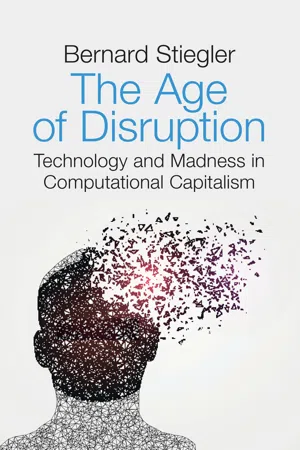
The Age of Disruption
Technology and Madness in Computational Capitalism
- English
- ePUB (mobile friendly)
- Available on iOS & Android
About this book
Half a century ago Adorno and Horkheimer argued, with great prescience, that our increasingly rationalized world was witnessing the emergence of a new kind of barbarism, thanks in part to the stultifying effects of the culture industries. What they could not foresee was that, with the digital revolution and the pervasive automation associated with it, the developments they had discerned would be greatly accentuated, giving rise to the loss of reason and to the loss of the reason for living. Individuals are now overwhelmed by the sheer quantity of digital information and the speed of digital flows, resulting in a kind of technological Wild West in which they find themselves increasingly powerless, driven by their lack of agency to the point of madness.
How can we find a way out of this situation? In this major new book, Bernard Stiegler argues that we must first acknowledge our era as one of fundamental disruption and detachment. We are living in an absence of epokh? in the philosophical sense, by which Stiegler means that we have lost our path of thinking and being. Weaving in powerful accounts from his own life story, including struggles with depression and time spent in prison, Stiegler calls for a new epokh? based on public power. We must forge new circuits of meaning outside of the established algorithmic routes. For only then will forms of thinking and life be able to arise that restore meaning and aspiration to the individual.
Concluding with a dialogue between Stiegler and Jean-Luc Nancy, this book will be of great interest to students and scholars in social and cultural theory, media and cultural studies, philosophy and the humanities generally.
Frequently asked questions
- Essential is ideal for learners and professionals who enjoy exploring a wide range of subjects. Access the Essential Library with 800,000+ trusted titles and best-sellers across business, personal growth, and the humanities. Includes unlimited reading time and Standard Read Aloud voice.
- Complete: Perfect for advanced learners and researchers needing full, unrestricted access. Unlock 1.4M+ books across hundreds of subjects, including academic and specialized titles. The Complete Plan also includes advanced features like Premium Read Aloud and Research Assistant.
Please note we cannot support devices running on iOS 13 and Android 7 or earlier. Learn more about using the app.
Information
Part One
The Epokhē of My LifePhilosophizing So as Not to Go Mad
1
Disruption: A ‘New Form of Barbarism’
1. The loss of reason
- in 1997, fifty years after the publication of Dialectic of Enlightenment, it was estimated that the world contained one billion television sets;
- on 3 April 1997, the US Federal Communications Commission (FCC) announced that the federal government would in 2006 shut off the analogue frequencies that were currently being used by 3,800 American radio and television stations, all of whom were advised to switch to digital by 2003;5
- in the spring of 1997, Craig Mundie, then a senior vice-president at Microsoft (a company represented on the board of the FCC), declared during a European visit that his company, which at that time dominated the information industry (now called the digital industry), would launch a bid to dominate the multimedia business, taking advantage of the opportunity presented by the convergence of information, media and telecommunications technologies.
2. From the slums of Temara to the presidency of the Université de technologie de Compiègne
3. From Richard Durn to Jean-Marie Le Pen: primordial narcissism of the I and reason for living
Table of contents
- Cover
- Contents
- Dedication
- Title page
- Copyright page
- Part One: The Epokhē of My Life
- Part Two: Madness, Anthropocene, Disruption
- Part Three: Demoralization
- Conclusion: Let’s Make a Dream
- A Conversation about Christianity
- Index
- End User License Agreement